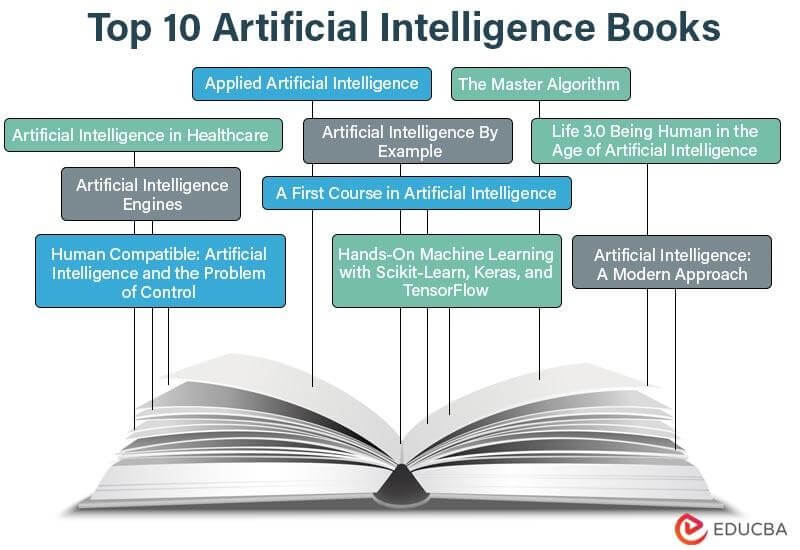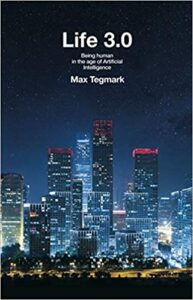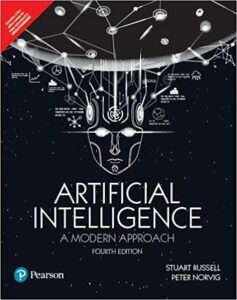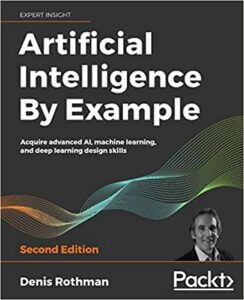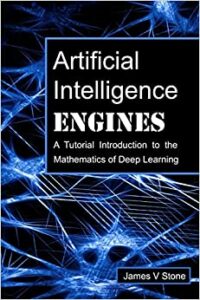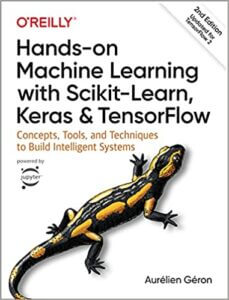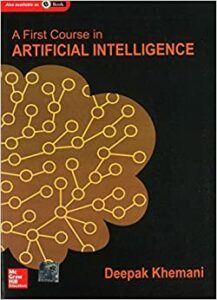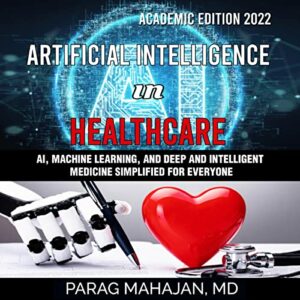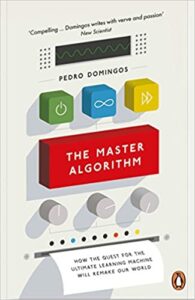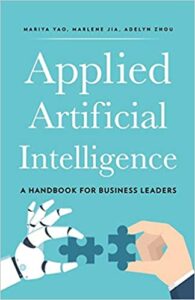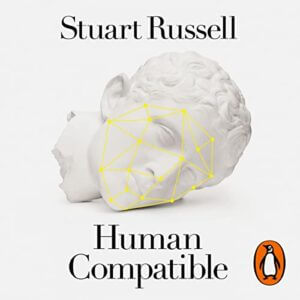10 Best Artificial Intelligence Books [2023]
The Artificial Intelligence books help the readers gain an insight into the intelligence of machines that perceive, synthesize, and infer information variants from human intelligence. Artificial intelligence addresses daily human interaction and is currently helping with advanced web searches on portals, systems for recommendations like Amazon, YouTube, and Netflix, systems that can recognize speech by a human-like Alexa and Siri, cars that drive on their own, gaming, and medicine- are all pursuits of AI.
The list of books that we have provided below will give the readers a clear understanding of Artificial Intelligence. These are essential reads for anyone who wants to increase their knowledge about the subject or requires to know more about it for career purposes.
We have compiled a list of top books to aid amateurs and professionals with Artificial Intelligence.
Let us discuss the reviews and takeaways of the Artificial Intelligence books.
Book #1 Life 3.0: Being Human in the Age of Artificial Intelligence
Author: Max Tegmark
Get this book here
Review:
The author has given a futuristic view of the impact of artificial intelligence in the crime world, justice, and its play in society. It also reflects on the nature of futuristic wars. The MIIT Professor Tegmark has explored the positive dimension of AI and guided mainstream research on its beneficial side. The book explores options for making a system robust and hack-free. It also answers concerns about whether AI will replace people in the job market or challenge their existence. The book also explores controversies about whether human life will exist in the cosmos.
Key Points:
- This book enables you to participate in the most crucial conversation in contemporary times – the impact of Artificial Intelligence in society, jobs, justice, war, crime, and our sense of being human.
- It reveals a vast gamut of the most controversial topics, beginning with superintelligence and ending at ultimate physical limits, consciousness, and the meaning of life in this universe.
- Tegmark also suggests positive ways of implementing the use of AI beneficially.
Book #2 Artificial Intelligence- A Modern Approach
Authors: Stuart J. Russell, Peter Norvig
Get this book here
Review:
Undergrad and grad level courses have selected Artificial Intelligence- the modern approach as the academic book for one to two semesters. The book covers up-to-date theoretical and practical usage of AI. Moreover, the reader explores the Internet as a sample in planning logical agents of intelligent systems and probabilistic learning approaches. The authors have also designed numerous exercises.
Key Points:
- The book includes machine learning, transfer learning, deep learning, and robotics. It talks about practical usage, including privacy, safe AI, and fairness.
- It provides a state-of-the-art and up-to-date introduction regarding the theory and practice of Artificial Intelligence for sophisticated applications.
- It discusses in detail the scope of AI probabilistic approaches, including EM.
Book #3 Artificial Intelligence By Example
Author: Denis Rothman
Get this book here
Review:
The book addresses the basic concept of AI and how to construct it. The reader can expect to think adaptively and employ the ideas in real-life situations. It will guide a reader through chess games to chatbots. It leads the reader through the application of Artificial intelligence to blockchain and IoT Internet of Things and AI.
Key Points:
- This book has AI-based illustrations that guide readers about the design and implementation of Artificial Intelligence.
- Using the Artificial Intelligence examples, readers can build machine intelligence from scratch.
- It has the potential to make you an adaptive thinker and enable you to apply knowledge to real-world situations.
Book #4 Artificial Intelligence Engines: A Tutorial Introduction to the Mathematics of Deep Learning
Author: James V. Stone
Get this book here
Review:
The book is the right place to start for a reader with little mathematics background. The author explores the artificial intelligence algorithms capable of functioning like deep neural networks of the brain. The book explains the role of AI and the reaches of Deep neural networks that can diagnose cancer, aid in object and speech recognition, chess, and many other games. The underlying factor is the adaptive algorithms. The book discusses ongoing neural networks and modern deep neural networks.
Key Points:
- This book is written in an informal style and includes tutorial appendices, a complete glossary, and a list of further readings.
- Artificial Intelligence Engines is a perfect introduction to the algorithmic engines of sophisticated Artificial Intelligence.
- Stone has richly illustrated key neural network learning algorithms and detailed mathematical analyses.
- The book has associated PowerPoint slides, open-source repositories, and online programs.
Book #5 Hands-On Machine Learning with Scikit-Learn, Keras, and TensorFlow: Concepts, Tools, and Techniques to Build Intelligent Systems
Author: Aurélien Géron
Get this book here
Review:
Géron provides deep learning for the amateur and seasoned programmer with minimal theory and maximum concrete examples. The users get to meet the challenges of machine learning with the coming of deep learning. The book guides how to make efficient programs using tools to learn from data. The book details Python frameworks like Scikit-Learn, Keras, and TensorFlow to gain intuitive insight into making intelligent systems.
Key Points:
- The book shows the user how to apply Scikit-learn for tracking end-to-end sample ML projects.
- Important models like decision trees, support vector machines, random forests, and ensemble methods help the reader understand AI in depth.
- The reader can immerse in net architecture, including recurrent nets, adversarial networks, and transformers.
- The author explains Keras and TensorFlow to pilot neural nets for natural language processing, computer vision, generative models, and deep reinforcement learning.
Book #6 A First Course
Author: Deepak Khemani
Get this book here
Review:
The author explains the fundamental bottom-up approach of Artificial intelligence, from search to knowledge-based methods. The book provides ample examples of classic search methods. Khemani explores the beam and tabu searches in depth using illustrations. It helps the reader with the problem-solving and intelligence portion of AI. The book is suitable for an introductory course to AI and will help the reader to familiarize themself with the world of AI.
Key Points:
- A First Course in Artificial Intelligence explains the basic concepts of AI and familiarizes with the intelligence portion.
- Khemani has explored AI search types with lucidity, differentiating from the classic and tabu to beam searches.
- The reader gets an opportunity to explore various problem-solving methods.
Book #7 Artificial Intelligence in Healthcare: AI, Machine Learning, and Deep and Intelligent Medicine Simplified for Everyone
Author: Dr. Parag Suresh Mahajan
Get this book here
Review:
Artificial Intelligence in Healthcare explores AI’s role in improving human health. Dr. Parag Suresh Mahajan (MD) explains how AI has made the most impact through Machine Learning in the health sector than any other field. He illustrates how Intelligent Medicine continues to serve millions of lives. Mahajan has written in the simple language yet covered the depths and leaps of AI intervention in the health industry.
Key Points:
- The reader gets familiarized with the current and future AI’s role in healthcare and how it serves millions of lives.
- The book explores the benefits and perils of AI to help the reader gain foresight in personal practices.
- The author has simplified data science and machine learning and goes into depth with the roles of startup companies.
Book #8 The Master Algorithm: How the Quest for the Ultimate Learning Machine Will Remake Our World
Author: Pedro Domingos
Get this book here
Review:
Pedro Domingos explains in his endeavor “The Master Algorithm” how AI is a self-building system that creates algorithms born out of algorithms from raw data. He ponders over the impact of machine learning on science, business, politics, and war. Above all, the stride to The Master Algorithm- is to get all knowledge from raw data.
Key Points:
- The author introduces the concept of algorithms that are capable of building themselves.
- The book explores the idea of achieving The Master Algorithm, the quest to find the algorithms that can derive all knowledge from data.
- The book is an insight into how machine learning is impacting the world.
Book #9 Applied Artificial Intelligence: A Handbook For Business Leaders
Authors: Mariya Yao, Adelyn Zhou, Marlene Jia
Get the book here
Review:
This book does not proclaim the destiny of people losing jobs to robots or the answer to all human problems. Instead, it is a practical approach to what AI can do for business leaders wanting to use the power of AI for productivity and raising the quality of living. One can combine data with design and technology to alleviate problems in a corporation. The book teaches prioritizing the favorable prospects for leading fruitful AI initiatives. It also removes the fallacies created by media hype on the effect of AI.
Key Points:
- This Artificial Intelligence Books is the ‘CES 2018 Top Technology Book of the Year.’
- It is a pragmatic guide for business leaders in leveraging machine intelligence for growth and the life quality within our communities.
- It enables you to resolve real problems at the enterprise scale with the combination of people, design, technology, and data.
Book #10 Human Compatible
Author: Stuart Russell
Get the book here
Review:
Stuart Russell has written a visionary book on the unrivaled achievement of humankind to create superior intelligence, which becomes a nightmare. Russell brings in his decades of experience in AI as he examines his discipline as an experiential threat to humankind. Humans will have to devise a plan to stop the oncoming trouble that would be compulsory.
Key Points:
- The book portrays the dreadful futuristic picture of AI taking over humankind.
- Russel has brilliantly laid out the loopholes in the construction of AI that could change a dream of an AI-efficient society to a nightmare.
- The author, who has worked in AI research for decades, proposes that if the necessary steps were not taken now, the human race would be at threat.
Recommended Books
We hope that this EDUCBA information on “AI Books” benefited you. You can view EDUCBA’s recommended articles for more information.
